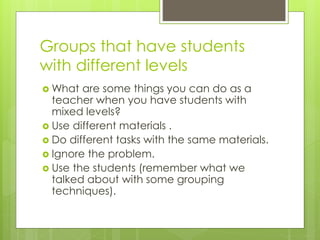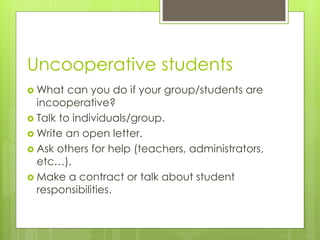Class ix classmanagement
- 2. Groups that have students with different levels ÔÇõ What are some things you can do as a teacher when you have students with mixed levels? ÔÇõ Use different materials . ÔÇõ Do different tasks with the same materials. ÔÇõ Ignore the problem. ÔÇõ Use the students (remember what we talked about with some grouping techniques).
- 3. Big class size ÔÇõ How can you deal with grading, lack of resources, the intimidation? ÔÇõ Use grouping techniques. ÔÇõ Have students be responsible. ÔÇõ Have group leaders. ÔÇõ Use choral reactions.
- 4. Students abusing L1 use ÔÇõ Once again, what can you do if this is happening in your class? ÔÇõ Talk to the students abotu the problem. ÔÇõ Encourage/Motivate them to use English. ÔÇõ Only respond to English use. ÔÇõ Create an English environment (use English as much as possible, expose them to as much English as possible) ÔÇõ Keep reminding them. ÔÇõ Punishment might be necessary.
- 5. Uncooperative students  What can you do if your group/students are incooperative?  Talk to individuals/group.  Write an open letter.  Ask others for help (teachers, administrators, etc…).  Make a contract or talk about student responsibilities.
- 6. Students who don’t want to talk  If students don’t want to talk, what steps can a teacher take?  Use pairwork and groupwork.  Don’t expect fluency to happen immediately-you may need to «control» their speech.  Use dictation, reading aloud, acting out dialogues.  Use role-plays.  It’s also important to remember that some students simply don’t want to talk-this does NOT mean that they aren’t learning or progressing.
- 7. Causes of Discipline Issues
- 9. Dealing with Discipline Issues
- 10. Positive vs. Negative Reinforcement  It’s time to do an activity!  What is the difference between positive and negative reinforcement? (this would be an excellent quiz question)
- 11.  One thing to remember is that we are English teachers, not the «English Police». While we can dedicate some time and some effort to discipline the group, our focus should always be on teaching those who want to learn. Dedicating too much time to try to get the class under control is unfair to those students, who in reality are the ones you can help the most.












